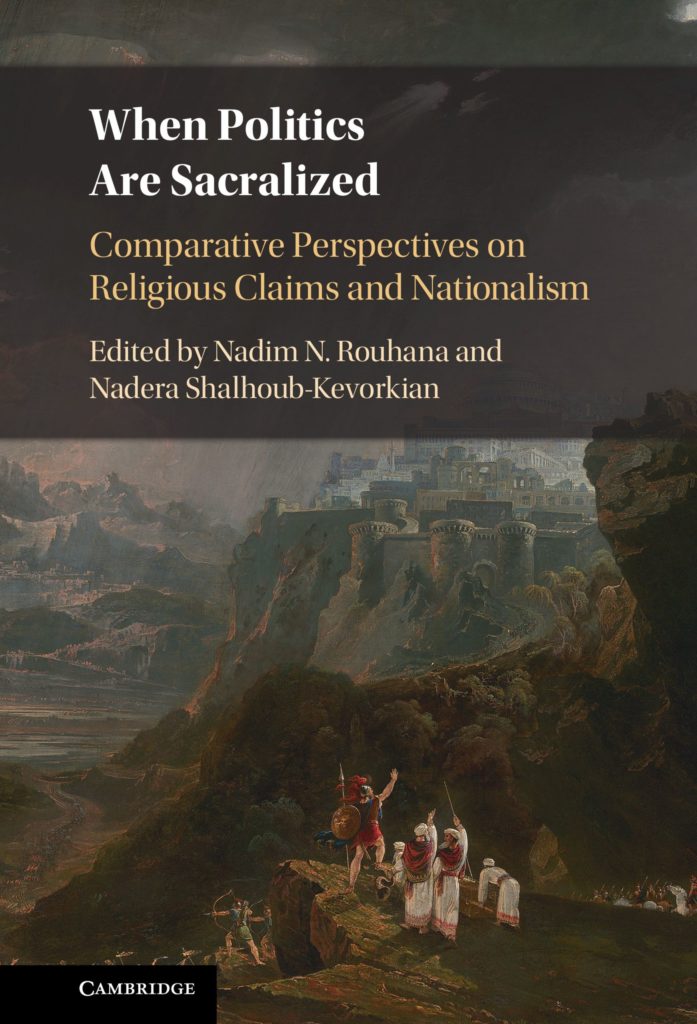 In the postsecular moment that the humanities now finds itself in, it is tempting to regard the questioning of the role of religion in politics as one that is old hat. Religion has always been political postsecular critics of liberalism and its secular framework have argued. In this instance, the postsecular represents the demystification of secular reason as neutral with regard to religion and invites renewed inquiry into the theological roots of secularity. Given this claim, our duty as scholars is to reveal the entanglements of religion with the state rather than contest them. And yet, without necessarily questioning the analytic truth of the co-constructed nature of religion and politics, When Politics are Sacralized: Comparative Perspectives on Religious Claims and Nationalism, edited by Nadim N. Rouhana and Nadera Shalhoub-Kervorkian, reminds us that the concepts of the secular and sacred are mobilized in ways that often have devastating real world political and social consequences. More specifically, in this wide-ranging volume, Rouhana and Shaloub-Kervorkian show that religion has served states across the world in legitimating claims to sovereignty in order to justify oppressive policies.
In the postsecular moment that the humanities now finds itself in, it is tempting to regard the questioning of the role of religion in politics as one that is old hat. Religion has always been political postsecular critics of liberalism and its secular framework have argued. In this instance, the postsecular represents the demystification of secular reason as neutral with regard to religion and invites renewed inquiry into the theological roots of secularity. Given this claim, our duty as scholars is to reveal the entanglements of religion with the state rather than contest them. And yet, without necessarily questioning the analytic truth of the co-constructed nature of religion and politics, When Politics are Sacralized: Comparative Perspectives on Religious Claims and Nationalism, edited by Nadim N. Rouhana and Nadera Shalhoub-Kervorkian, reminds us that the concepts of the secular and sacred are mobilized in ways that often have devastating real world political and social consequences. More specifically, in this wide-ranging volume, Rouhana and Shaloub-Kervorkian show that religion has served states across the world in legitimating claims to sovereignty in order to justify oppressive policies.
Whether it is Zionist claims to an exclusively Israeli Jewish state, Hindutva claims to an exclusively Indian Hindu state, or Sinhalese Buddhist claims to an exclusively Buddhist Sri Lankan state, in various settings political leaders in ostensibly secular states have drawn on religious claims to shore up their authority and suppress dissent. In addition to these examples, others discussed in the book include Northern Ireland, Saudi Arabia, Serbia, and Palestine. The risk in bringing so many different examples together under one volume is that any generalizable results will be lost in the details. However, by laying out a framework within which these essays operate in their introduction, the co-editors persuasively show how nationalism, religion, and the state have been forged in the fires of western modernity and spread around the world.
The contributors to the symposium on this important book toggle between providing their own examples of the sacralization of political claims and the wider theoretical claims with which the book asks us to reckon. Gladys Ganiel draws on her research in Northern Ireland to show the importance of analyzing political and social structures in changing political and social realities. She contends that future work on religion should also focus on the everyday, intimate experiences of religion. Joram Tarusarira, meanwhile, compares the cases in the book with that of Zimbabwe, especially in the religious rhetoric surrounding former President Robert Mugabe and the churches that shored up his authority. His claim, in the end, is theologically normative (and echoes the prophetic strain in Christianity): When Christians become more invested in shoring up political power, they risk forgetting their mission to challenge authority.
Elizabeth Shakman Hurd and Raef Zreik move in more theoretical directions. Hurd engages with the risk inherent in the co-editors contention that secularization would lead to more peaceful societies. Unlike the postsecular critics mentioned up front in this essay, however, Hurd is keen to show that unravelling the theological roots of the secular is not simply an academic exercise, but instead is one that allows us to address substantial issues of inequality more directly. It does so by drawing our attention to different modes of religious interpretation that might otherwise be obscured if we were to assume that all religion is poisonous. Raef Zreik wrestles with the need for conceptual knowledge but also the need to tie conceptual knowledge to material contexts. He traces the desire for abstraction back to Immanuel Kant and follows it through to other major figures and trends in US and European philosophy. In doing so, Zreik asks us to reckon with the deeper theoretical stakes of comparative work like that carried out by the contributors to this book.
Given the genealogical turn that has no doubt also influenced the postsecular turn, comparative studies are often seen as inherently risky. Do they not obscure the particularities of a situation in order to advance a generalizable thesis? What Rouhana and Shaloub-Kervorkian, along with the contributors to this edited volume and symposium show, is that it is possible to engage in comparative work that is attentive to history, social and political complexity, and diversity without losing track of the more abstract concepts that are necessary to compare cross-culturally. In doing so, they remind us that we cannot restrain our work to one context. This is because even though modernity, secularization, and nationalism may have roots in the west, their effects have extended far beyond that origin.

